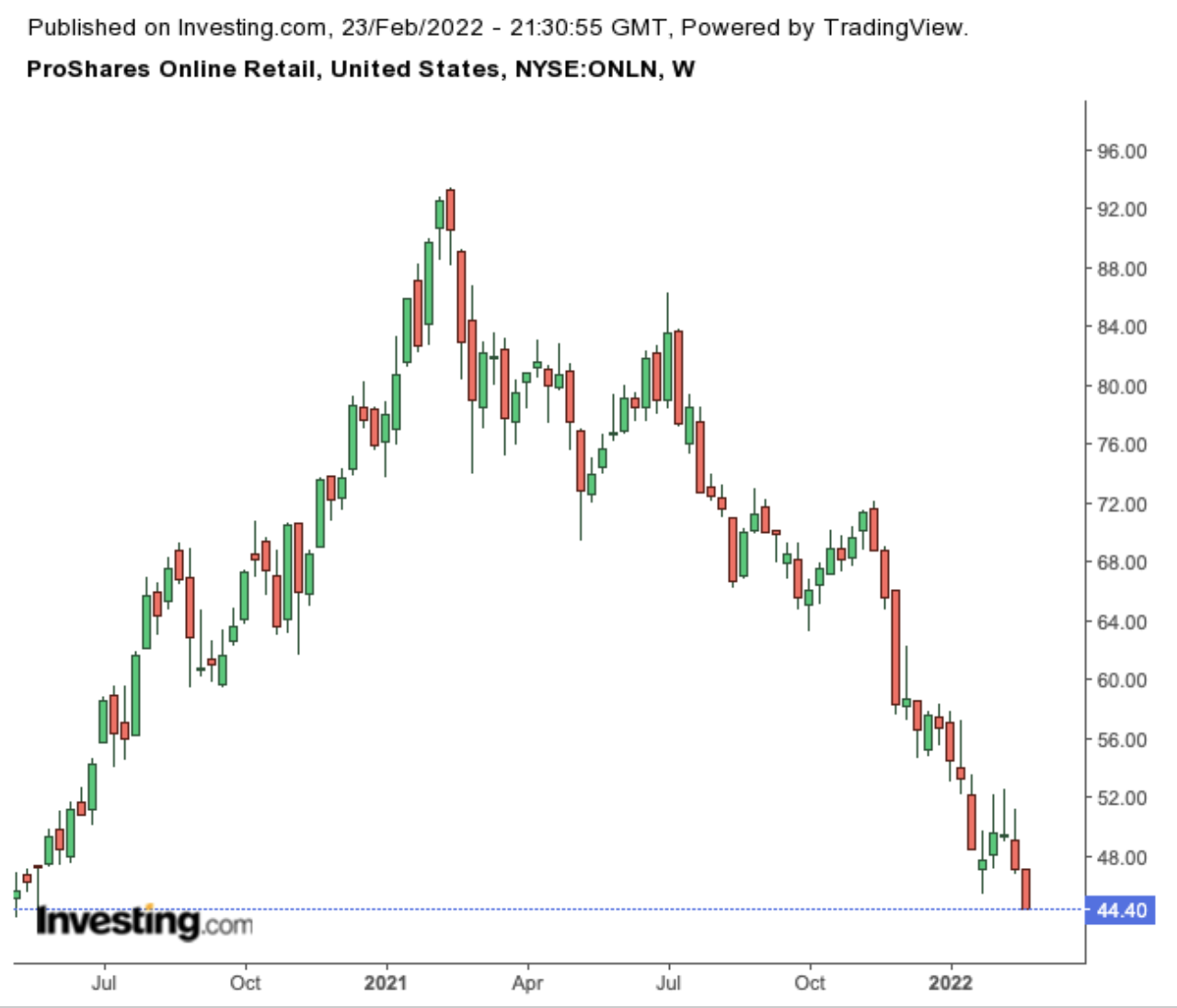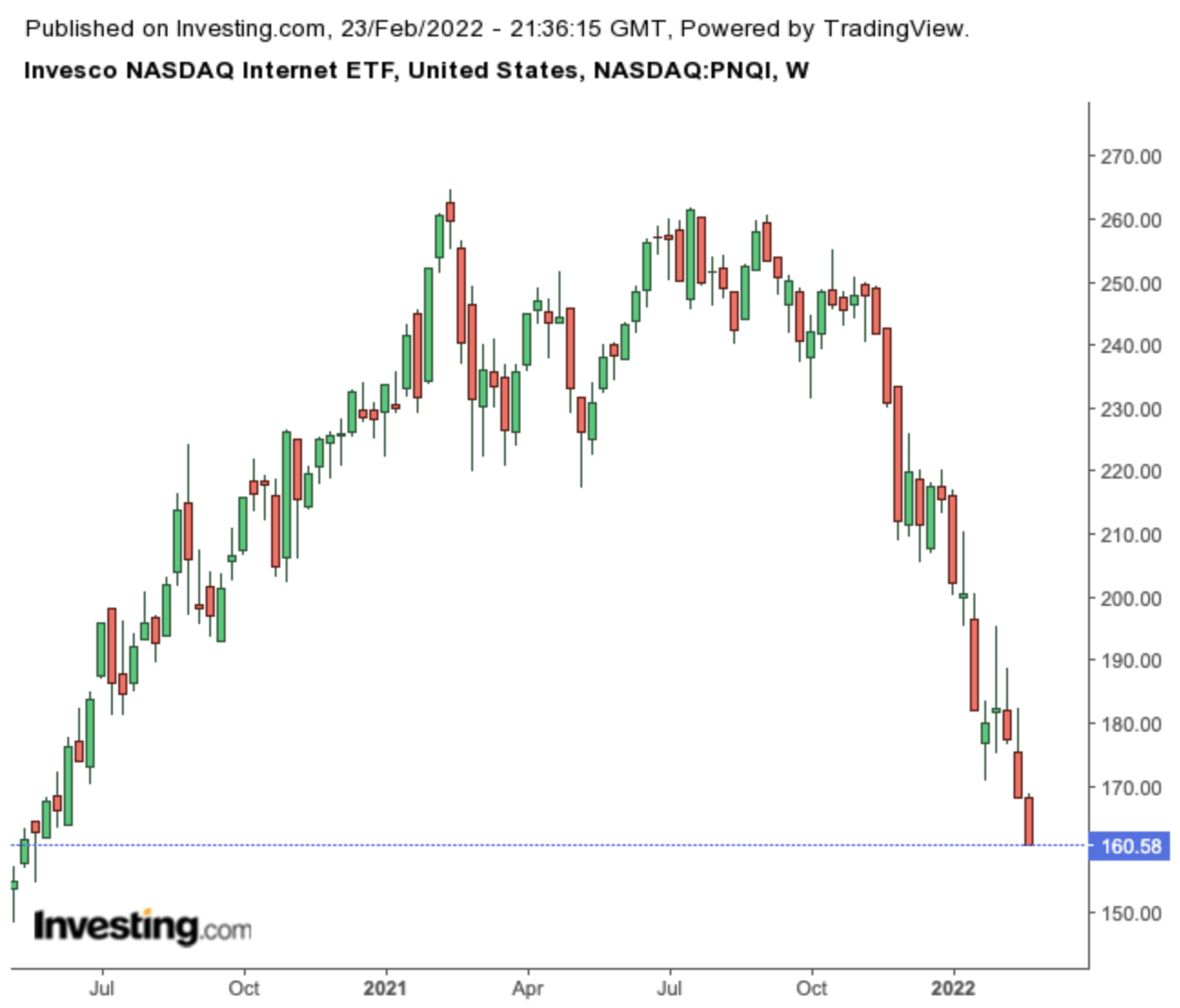The last two years of pandemic conditions have put e-commerce (or e-tail) stocks in the spotlight, as consumers worldwide found themselves locked down and doing their shopping from home. But as more countries ease COVID-19 restrictions, brick-and-mortar retailers are progressively reclaiming their market share, making the retail space more competitive.
As a result, the share of e-commerce within total sales stateside narrowed to 13.2% in 2021, compared to a 13.6% share in 2020.
A similar shift has been happening on Wall Street. The Dow Jones Retailers Index declined 0.6% in the past year, whereas the Dow Jones Internet Commerce Index lost 29.1%. Understandably, investors wonder what next the e-commerce segment in 2022.
However, despite the ebbs and flows in shares prices in the short run, we can expect e-tailing metrics to stay strong in the years ahead. By 2025, e-commerce revenue in the US should go well over $1.3 trillion.
Moreover, a recent US Census Bureau update highlights that:
“Total e-commerce sales for 2021 were estimated at $870.8 billion, an increase of 14.2% (±0.9%) from 2020.”
That said, here are two exchange-traded funds (ETFs) that offer diversified baskets of e-commerce-related stocks. These funds could appeal to investors looking for returns in the online retail industry while spreading risks instead of focusing on individual names.
1. ProShares Online Retail ETF
- Current Price: $44.40
- 52-Week Range: $44.40 - $91.57
- Expense Ratio: 0.58% per year
The ProShares Online Retail ETF (NYSE:ONLN) gives access to global e-tailers who market products online, including sales over the Internet, mobile, and app. However, the fund excludes online travel firms.

ONLN, which tracks the returns of the ProShares Online Retail Index, currently has 39 holdings. The fund was launched in July 2018 and net assets are almost $620 million.
Close to three-quarters of the names are from the US. Next come stocks from China (16.8%), Taiwan (3.4%), Mexico (2.0%), and Argentina (1.9%).
Meanwhile, the top 10 stocks comprise over 60% of the portfolio. But the fund’s performance is heavily impacted by two e-commerce giants, namely Amazon.com (NASDAQ:AMZN) and China's Alibaba (NYSE:BABA). Their current combined weighting is 37%.
Other companies of note include the online marketplace eBay (NASDAQ:EBAY); Chinese e-tail heavyweight JD.com (NASDAQ:JD); food delivery platform DoorDash (NYSE:DASH); and Chewy (NYSE:CHWY), which sells pet products online.
About a year ago, in mid-February 2021, ONLN went over $91 per share to hit a record high. But that price is now in the rearview mirror. Since then, the ETF has lost over half its value. And year-to-date, ONLN is down to 22.5%. Moreover, the fund is currently sitting at its 52-week low.
Recent research suggests global e-commerce sales should reach $5.1 trillion by 2026. In 2020, the market was valued at $2.3 trillion. Thus, long-term investors, whose portfolios can tolerate short-term choppiness, could consider the recent decline an opportunity to invest in an e-commerce fund like ONLN.
2. Invesco NASDAQ Internet ETF
- Current Price: $160.58
- 52-Week Range: $160.58 - $261.71
- Expense Ratio: 0.6% per year
Our next fund, the Invesco NASDAQ Internet ETF (NASDAQ:PNQI), is an indirect play on the growth of e-tailing. The fund, which started trading in June 2008, provides broad exposure to Internet-related businesses stateside.

PNQI, which has 83 stocks, where the leading 10 stocks account for almost 60% of net assets of $677.8 million.
In terms of the sub-sectors, we see interactive media & services (24.06%), Internet & direct marketing retail (22.23%), and software (16.76%). As this breakdown shows, a number of these companies provide the backbone for e-commerce. Others are social media platforms where firms market their products online.
While social networks have become a big part of people’s daily lives, traditional shopping trends have also shifted toward social commerce. According to recent metrics, about half of US adult social media users have made a purchase via social media in the past year.
Therefore, a fund like PNQI could act as a gateway to names that will benefit from the growing influence of social commerce. Among the leading names in the ETF are Alphabet (NASDAQ:GOOGL), Amazon, Adobe (NASDAQ:ADBE), Meta Platforms (NASDAQ:FB), and Netflix (NASDAQ:NFLX).
Year-to-date, the fund is down about 23%. Also currently sitting at its 52-week low, PNQI has lost 36% of its value over the 12 months.
Given potential headwinds ahead, such as monetary policy changes by the Fed and the start of outright military tensions in Eastern Europe, interested readers could wait for more clarity before hitting the buy button now. However, long term, we’re bullish on many of the names in the fund.
